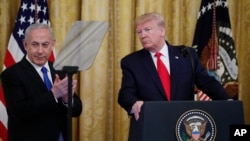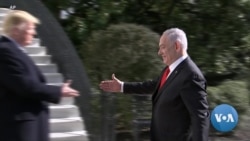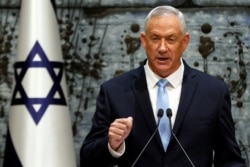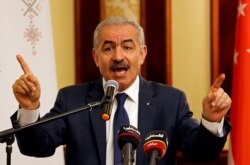U.S. President Donald Trump unveiled his plan to resolve the Israeli-Palestinian conflict on Tuesday, nearly six years after talks between the two sides broke down.
The plan calls for the establishment a Palestine state, a key issue for Palestinian leaders who have long called for a “two-state resolution” to the conflict.“
This is an unprecedented and significant development,” Trump said Tuesday at the White House.
Further details were not immediately disclosed, but Trump administration officials say the plan greatly increases the territory controlled by the Palestinians, although it also recognizes Israeli sovereignty over large settlements in the West Bank, a proposal that will almost certainly draw opposition from Palestinians.
The White House event was emblematic of the state of relations among the three parties, with Netanyahu appearing alongside Trump and Palestinian leaders saying they were not invited.
Ahead of the plan's release, Trump met with Netanyahu and dismissed the concerns of the Palestinians, who have rejected the U.S. leader's approach and what they say are his pro-Israel policies.
WATCH: Israel peace deal
Before it was unveiled, Palestinian Prime Minister Mohammad Shtayyeh said the Trump plan was no more than a way to "finish off the Palestinian cause."
After Trump met separately Monday with Netanyahu and his chief political rival Benny Gantz, Netanyahu said there is a chance to "make history and define Israel's borders." He also praised Trump for making the U.S.-Israeli alliance "stronger than ever."
Gantz called the peace deal "a significant and historic milestone" and one he looks forward to implementing if he becomes the next Israeli prime minister following elections in March.
The Trump administration has been working on a peace plan since it took office in 2017. He says he delayed revealing it because of what he says is political uncertainty in Israel.
But the Palestinians have refused to work with the U.S., dismissing the peace plan even before it was publicly released. Palestinians are furious with Trump for recognizing Jerusalem as the Israeli capital and moving the U.S. embassy there. Palestinians want east Jerusalem as the capital of a future state.
They are also angry at Secretary of State Mike Pompeo's recent declaration that Jewish settlements in the West Bank are legal, and the Trump administration's decision to cut humanitarian aid.
The United States released the economic portion of the peace plan last year. It calls for $50 billion in international investment in the Palestinian territories and neighboring Arab areas.
The Palestinians say they are insulted that some people believe you can just throw money at them without talking about a two-state solution.
"We reject it and we demand the international community not be a partner to it because it contradicts the basics of international law and inalienable Palestinian rights," Shtayyeh said.









